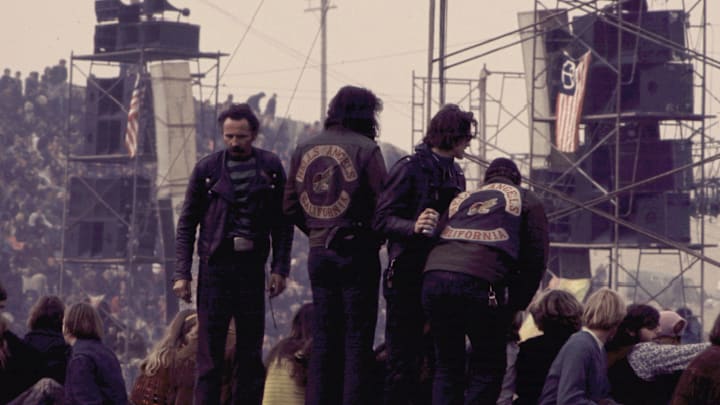Gimme Shelter (1970)
A few months after Woodstock, there was another massive concert. This one took place in California’s Central Valley on December 6, 1969, at a racetrack called Altamont. It was a very different vibe from that of Woodstock.
The Rolling Stones were concluding a North American tour with a free concert. They had some Woodstock veterans – Santana, CSN – join them. But it became clear from the outset that there were problems. As with Woodstock, crowds swelled to more than ten times initial expectations. The only security was provided by the notorious Hells Angles biker gang.
Instead of controlling an unruly crowd, they spurred on more and more violence. Jefferson Airplane singer Marty Balin was knocked unconscious by one of these “security” guards, and another headliner, The Grateful Dead, chose not to go on as the violence escalated. Finally, during the Stones' final set, a concert-goer named Meredith Hunter rushed the stage and got into an altercation with the Angels. He returned a few moments later with a gun and was stabbed to death.
Through it all, Albert and David Maysles, among the leading lights of the “direct cinema” movement captured it all. Along with their editor partner Charlotte Zwerin, they caught the moment of Hunter’s death, which would be used in the subsequent court case against the Hells Angel member who wielded the knife. (He was acquitted on the basis of self-defense.)
Among the stunning moments in the film is when the Maysles had Mick Jagger watch that footage some months after the fact and offer his feelings. Film and music critic James Parker has noted that there is another crucial moment during the concert when Jagger tries unsuccessfully to calm the crowd. But it is a hopeless endeavor.
That moment seems to sum up a great deal of what was happening on screen in the world of ’70s rock and roll musicals. Even as rock and roll was at its peak, there was the sense of an ending already on the horizon. The Buddy Holly Story and The Rose were about death.
Ziggy Stardust and the Spiders From Mars, The Last Waltz, and Phantom of the Paradise were about eras coming to an end. The whiplash 180 from Woodstock to Gimme Shelter demonstrates that more clearly than any pair of movies I know of. A violent future awaited.
(As a footnote – one of the greatest American movies ever made was also a music movie made in the 1970s, which suggested a violent future that could not be controlled. It isn’t about rock and roll. It’s about country music. And if you have never seen it and this subject interests you, I’d suggest watching Robert Altman’s Nashville at your earliest convenience.)
